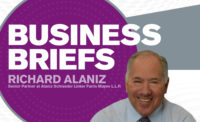
|
| Richard D. Alaniz |
If one of your employees calls her boss an insulting or obscene name on her Facebook page, you might think you could fire her without fear of reprisal. But you could be wrong.
One company, American Medical Response of Connecticut Inc. (AMR), found itself in exactly that situation. One of its employees, Dawnmarie Souza, was asked by her supervisor to prepare a report after several complaints about her job performance. Souza, a union member, requested a union representative while she completed the report. Her supervisor denied the request. After her shift ended and she went home, Souza posted insulting and profane comments about her supervisor on Facebook, which spurred comments from other AMR employees. Shortly afterwards, AMR fired Souza, citing complaints about her unprofessional behavior.
The National Labor Relations Board (NLRB) filed an unfair labor practice complaint against AMR, alleging that the Facebook posts were protected speech under federal labor laws. AMR settled the case before trial, and in a separate settlement agreed to revise its Internet-posting policy.
Employees have always complained about their jobs, bosses, and coworkers. Today, such complaints can reach a much larger audience than in the past. Employee complaints and rants are blogged, tweeted, posted, uploaded, and can be dispersed to millions of others. Some employers have responded by disciplining workers, and increasingly, the NLRB has stepped into these cases, including some that involve non-union workers and workplaces.
The legal and regulatory landscape around employers’ rights, employee free speech, and social media is still evolving. Employers need to be up to date on the latest developments, and carefully craft social media policies that protect the company’s reputation but will also stand up in court and before regulatory officials.
NLRB Examines More Social Media Cases
Under the National Labor Relations Act (NLRA) of 1935, private-sector employees, including non-union employees, have certain rights to air their grievances. The NLRB, which enforces the Act, has recently seen more cases arise that implicate these rights in a social media context.
In general, the NLRB’s decisions turn on whether online postings can be deemed certain “protected concerted activity,” which is protected under the NLRA. Such activity involves statements that relate to terms or conditions of employment and involve other employees in issues related to employment, such as discussing pay and other work conditions. In order to be a protected concerted activity, the discussion must involve or affect a group of employees, not an individual worker.
The NLRB recently released a report that touched on the interplay between protected concerted activity and social media, saying: “These tools can encompass text, audio, video, images, podcasts, and other multimedia communications. Recent developments in the Office of the General Counsel have presented emerging issues concerning the protected and/or concerted nature of employees’ Facebook and Twitter postings, the coercive impact of a union’s Facebook and YouTube postings, and the lawfulness of employers’ social media policies and rules.”
The latest NLRB report underscored two main points: Employer policies should not be so broad that they prohibit protected activity; and “mere gripes” usually are not protected if they are not made in relation to group activity among employees.
Among the cases the NLRB outlined in the reports:
• In one case, a restaurant fired two employees who had a Facebook conversation with a former employee about the restaurant’s tax withholding practices. The NLRB found that the firings were illegal, because the employees were engaging in protected concerted activity. The NLRB also found the restaurant’s Internet and blogging policy, which prohibited “inappropriate discussions,” was too broad and vague to be legal.
• In another case involving Facebook, the NLRB ruled that a luxury car dealership illegally fired an employee for posting comments on his Facebook page that criticized a dealership sales event. According to the NLRB, the postings were “part of a course of protected, concerted conduct related to employees’ concerns over commissions and were not disparaging of the Employer’s product or so ‘egregious’ as to lose the Act’s protection.”
• However, in another case, the NLRB ruled that a newspaper could legally fire an employee who posted “unprofessional and inappropriate tweets” to a work-related Twitter account. In that case, the reporter used the Twitter account to criticize coworkers, and to complain about his public safety beat. The NRLB found that the newspaper could legally fire him because his conduct wasn’t protected or concerted: “(I)t did not relate to the terms and conditions of his employment or seek to involve other employees in issues related to employment. Ignoring his Employer’s warning, he continued to post inappropriate tweets while covering his beat,” the report noted.
• The NLRB also found in one case that an employee’s individual complaints were not concerted activity. In that instance, management at a retail store disciplined a customer service employee for posting profane Facebook comments that criticized store managers.
What Employers Should Do Now
Social media usage will continue to grow in the time ahead. To keep employee social media usage appropriate, employers should adopt social media policies that are narrow enough for the NLRB to find them legally enforceable, but broad enough to prevent as much negative exposure of a company as possible.
Because the NLRB has targeted some social media policies as overbroad, it may be tempting to just leave social media out of the employee handbook. However, such a strategy could prove damaging in the long run. Without clear policies and guidance, employers could be subject to more legal and regulatory liability if managers and supervisors take individualized approaches to disciplining employees over social media usage. Or, employers could have zero recourse in the event an employee consistently uses social media outlets to bash the company.
Neither can employers ban employees from any kind of social media interaction that references the company or workplace. Not only could such bans violate NLRA, they can damage employee morale and deprive the company of potential positive marketing exposure.
Employers should invest time and thought into developing or updating their social media policies to comply with the NLRA while also permitting discipline of employees who inappropriately use social media. Companies should involve sales and marketing, human resources personnel, IT personnel, and legal counsel to create the most comprehensive, useful, specific policy possible.
Several things employers should consider when developing or updating social media policies are:
• Understand what “protected, concerted activity” can include, and be sure that the policy doesn’t prohibit such activities.
When a manager learns that employees are criticizing him or her on Facebook, it’s natural to want to respond. Social media policies need to address exactly these types of situations. Employees and supervisors need clear guidance on what is acceptable and legal. In the eyes of the NLRB, one employee griping about his or her manager is not the same as a group of employees complaining about their paychecks.
• Specific policies are better than vague ones.
Employers should not try to cover every possible situation with one or two guidelines. The decisions indicate the NLRB is more willing to accept policies that are very limited and specifically address business-related issues such as sexual harassment, confidentiality, intellectual property, and the like. It’s a good idea to include some hypothetical examples to provide as much guidance as possible.
• When in doubt, escalate.
Social media is rapidly evolving and so are regulatory actions and court rulings. If managers and supervisors have any questions about whether an employee’s actions violate the company’s social media policies, they should consult with the company’s human resources personnel and legal counsel before issuing any type of discipline.
• Review the policy frequently.
Employers should periodically review their policies to be sure they are keeping up with the latest social media rulings.
• Be careful about monitoring employees’ social media life.
It’s good business for companies to track how they are being discussed online. By periodically conducting searches online or setting up Google Alerts to flag mentions of the company, employers can protect their brands and reputations. However, employers should not be trolling the Internet to seek out employees’ social media postings. Such an action could be considered “surveillance” under the NLRA, which could be illegal.
Balancing employee free speech and protected activity is increasingly complicated in today’s social media environment. Employers should work proactively and educate supervisors, managers, and employees about what is acceptable under federal law and what types of comments can get workers legally fired.
Publication date: 03/19/2012









